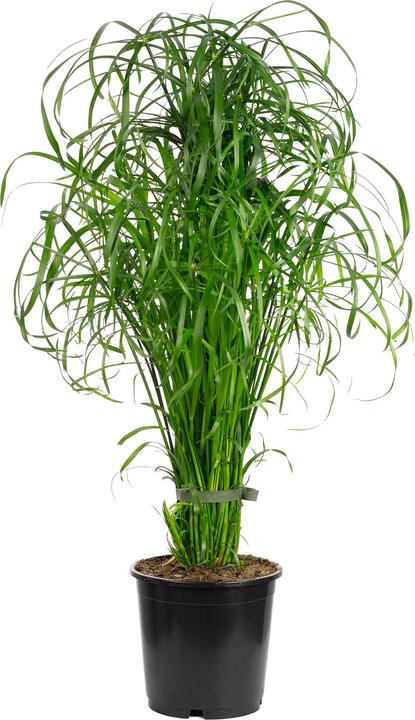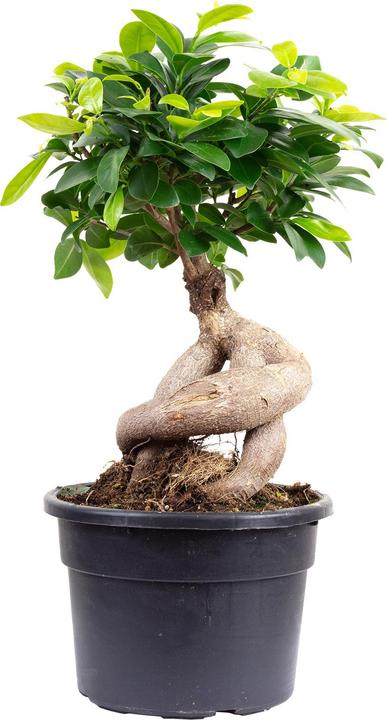
Best selling Plants from Flowerbox
On this page you'll find a ranking of the best Flowerbox products in this category. To give you a quick overview, we've already ranked the most important information about the products for you.
1. Flowerbox Chinesische Feige - Ficus Ginseng
The Chinese fig (Ficus ginseng) is a fascinating plant with a unique bonsai character. Its strong, gnarled roots and dense, lush green canopy give it an exotic aura. It brings elegance, harmony and a touch of Far Eastern Zen flair to your home or office.
Easy to care for and beautifully shaped. Despite its sophisticated look, this plant is surprisingly uncomplicated. It loves light to semi-shady locations and only needs moderate water - but waterlogging should be avoided. Occasional spraying provides an extra dose of freshness and keeps the leaves healthy and shiny.
Slow growth and easy care. Ficus Ginseng grows slowly and remains compact for a long time. Thanks to its strong roots and robust nature, it is easy to care for and only needs to be repotted every few years. Pruning can help it to grow even bushier.
Air-purifying and relaxing. In addition to its impressive appearance, this plant filters pollutants from the air and improves the indoor climate. Its harmonious growth and natural greenery create a calming atmosphere - perfect for living spaces or the workplace.
A stylish mini tree with character that brings peace and nature into your home.

2. Flowerbox Fiddle-leaf fig - height ca. 100 cm, pot-Ø 21 cm - Ficus Lyrata
The Fiddle Leaf Fig - also called Ficus lyrata - owes its name to the extremely large, dark green, shiny leaves that resemble the body of a fiddle. It belongs to the mulberry family (Mauraceae) and is particularly popular because of its very unproblematic culture. It also feels comfortable in hydroponics. It is very easy to care for and does not require much water. The trendy plant prefers a light or semi-shaded location.
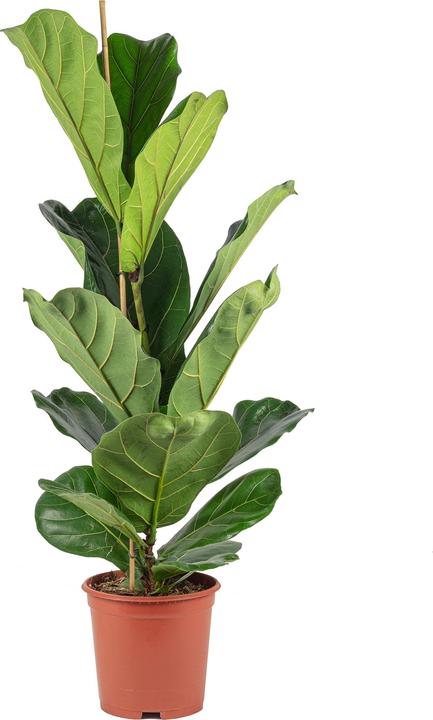
3. Flowerbox Set of 3 indoor plants Chamaedorea, Dieffenbachie, Dracaena - pot-Ø 10-12 cm
The indoor plant set of three includes a Chamaedorea, a Dieffenbachia, and a Dracaena. These three beautiful houseplants complement each other perfectly. The set is ideal for beginners in indoor gardening due to the low-maintenance nature of the plants.
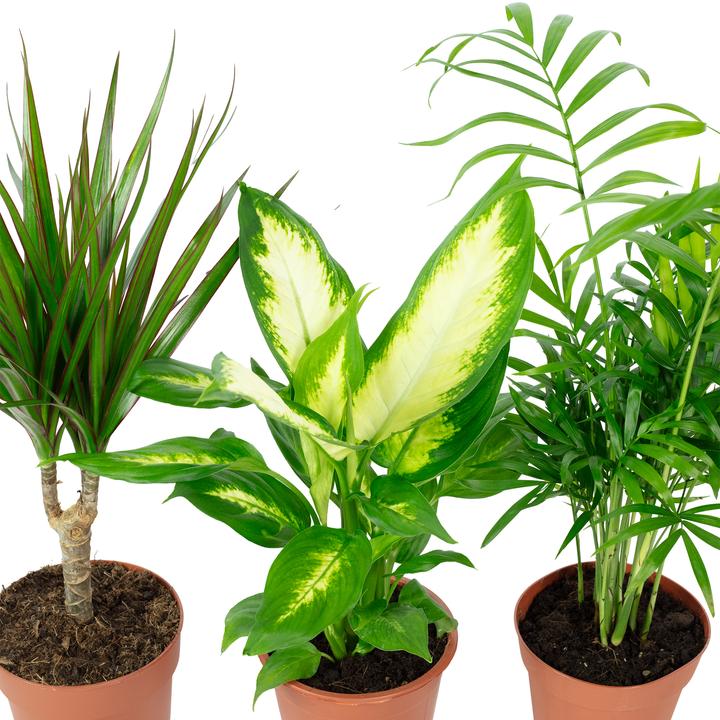
Flowerbox Set of 3 indoor plants Chamaedorea, Dieffenbachie, Dracaena - pot-Ø 10-12 cm
30 cm
4. Flowerbox Rubber tree - Ficus elastica Robusta
Ficus elastica, also known as the rubber tree, belongs to the mulberry family and originally comes from India and Indonesia. There, the rubber tree can grow up to 25 meters tall. In Germany, it was particularly popular as a houseplant in the 1980s and has been making a comeback in recent years. The "Robusta" variety is a very low-maintenance and robust type that, with its leathery, vibrant green leaves, is especially well-suited as a solitary plant in offices or living rooms.
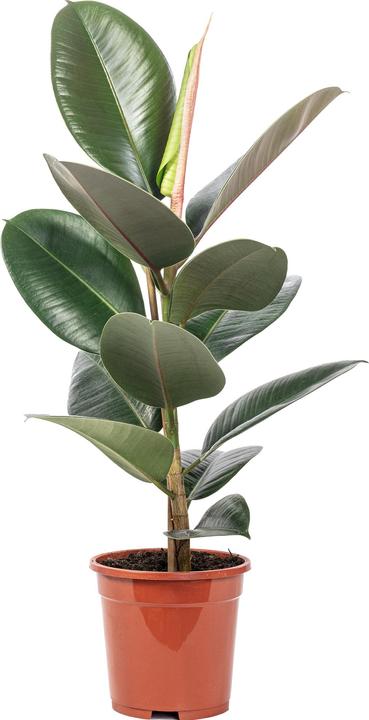
5. Flowerbox Bogenhanf - Sansevieria trif. Black Coral
The 'Black Coral' snake plant is the perfect choice for those who have little time but a keen sense of style. With its dark green, slightly wavy leaves and silvery-green stripes, it creates a modern, minimalist atmosphere. Whether in the living room, office, or bedroom, this plant adds elegance and freshness to any space.
Easy to care for and nearly indestructible, snake plants are true survivalists! They require little water and can tolerate longer dry periods. A bright location is ideal, but the snake plant is also content in low light. Direct sunlight or shade? It thrives in both conditions. Optimal temperatures range from 15 to 30 °C.
With its upright, slow growth, the snake plant remains compact for a long time. Repotting is only necessary every few years when the roots outgrow the pot.
Originally from West Africa, Sansevieria is one of the best air-purifying plants—perfect for a healthy indoor climate. Additionally, it releases oxygen at night, making it an ideal bedroom plant. Robust, decorative, and almost indestructible!
A stylish, low-maintenance eye-catcher for your home!.
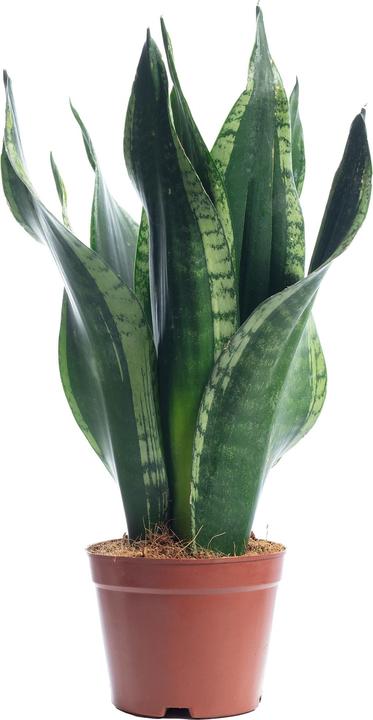
6. Flowerbox Benjamin fig Natasja branched - height ca. 30 cm, pot-Ø 12 cm - Ficus benjamini
The Weeping Fig is also known as Ficus benjamini. It originates from northern Australia, Myanmar, and India. Ficus benjamini Natasja is a loosely branched shrub with leaves that are bright to dark green and glossy.
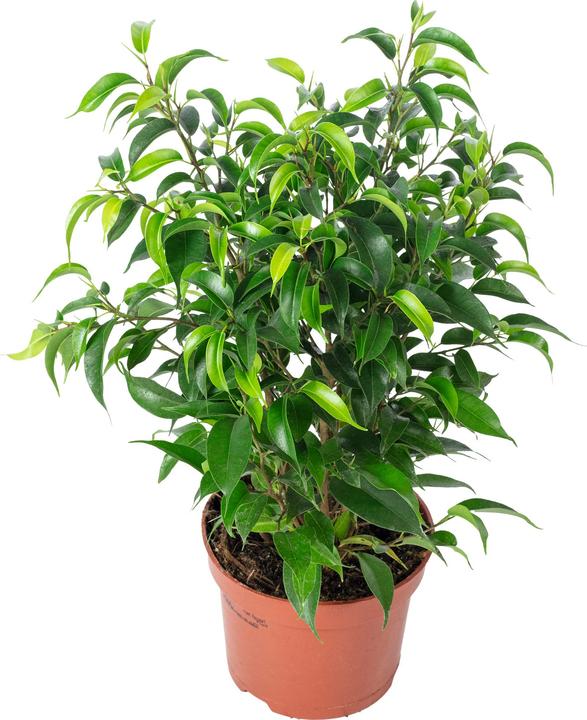
Flowerbox Benjamin fig Natasja branched - height ca. 30 cm, pot-Ø 12 cm - Ficus benjamini
30 cm
7. Flowerbox Bogenhanf - Sansevieria trifasciata Superba
Bring timeless elegance into your home with the arching hemp 'Superba'. Its broad, upright growing leaves with their rich green colouring and soft, golden yellow edges make it a stylish highlight in any room. Robust, easy to care for and virtually indestructible - this plant is perfect for anyone who is short on time but still wants a green home.
This bow hemp is a real survivor. It only needs water occasionally, can survive longer periods of drought and adapts to almost any location. Whether sunny, semi-shady or even in slightly darker corners - it always remains a decorative eye-catcher.
Sansevieria grows slowly and remains compact for a long time. Repotting is only necessary every few years if the pot becomes too small. Its strong leaves retain their shape and beauty for years without requiring much care.
Sansevieria is one of the best air-purifying plants. It filters pollutants out of the air and also produces oxygen at night - ideal for the bedroom. A plant that is not only decorative, but also actively contributes to improving the indoor air.
A stylish and easy-care roommate that makes your home greener and healthier.
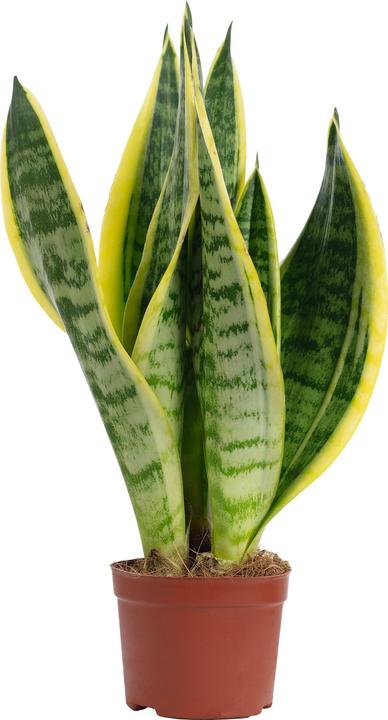
8. Flowerbox Set of 2 Ivy - Epipremnum aureum
The evergreen pothos grows as a climbing plant, enduring and herbaceous, and forms long shoots. This makes it an excellent choice for hanging plants as well as for greening room dividers, stair railings, or walls in a conservatory. The leathery leaves of the pothos are heart-shaped and are alternately arranged on short stems. They often feature a spotted or striped pattern in white, cream, or yellow.
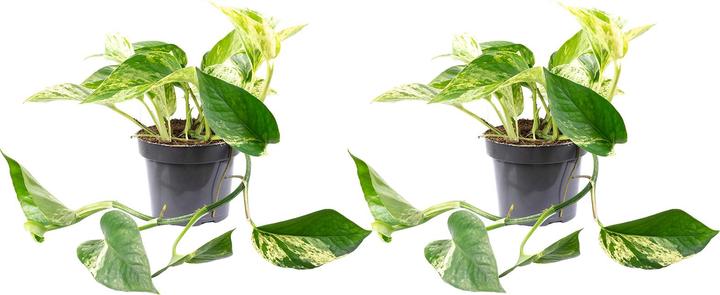
9. Flowerbox Mountain palm - Chamaedorea elegans
The Chamaedorea elegans, also known as the parlor palm, is a feather palm native to Central America. It is a very low-maintenance houseplant and forms a harmonious plant set together with the golden fruit palm. The fronds are adorned with many dark green leaflets.
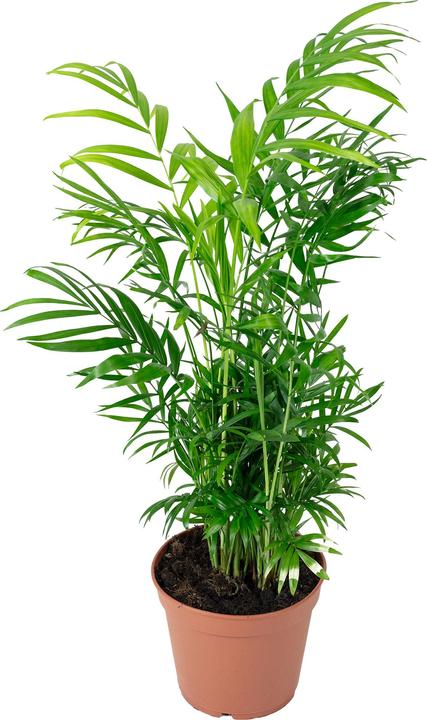
10. Flowerbox Zyperngras - Cyperus alternifolius
The Cyprus grass (Cyperus alternifolius) brings a tropical flair to your home with its umbrella-shaped leaves. Its upright, filigree stems are reminiscent of small palm trees and create a fresh, lively atmosphere. This plant loves moisture and is a real eye-catcher for living rooms, balconies or conservatories.
Easy to care for and water-loving, Cyprus grass loves to be watered regularly - the moister the soil, the better. It thrives particularly well in bright locations, but can also cope with partial shade. The soil should always be kept moist, which is why a saucer with water or a water storage pot is particularly suitable.
Cyperus alternifolius grows quickly and forms bushy, green stems that can be cut back as required. During the warmer months, the plant can also be placed outside - on the balcony, patio or at the edge of a pond. Important: It is not hardy and must be brought indoors at temperatures below 10 °C.
The plant releases a lot of moisture into the environment and thus improves the indoor climate. It is also non-toxic to pets, making it a suitable choice for cat and dog owners.
A tropical eye-catcher that brings freshness and lightness into your home - perfect for anyone who likes to water.
